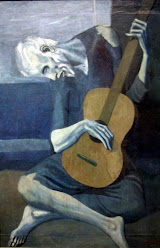by the way, am I the only one in the world that calls it a taxicab?
Anyways, my taxicab driver's name was Mohammed.
he started asking me about my life, what I study, etc. and so i naturally inquired about his life as well. He told me he was from Pakistan, and i immediately began to tell him about my research on the Middle East, and my imminent trip to Turkey.
I think that really sparked his interest, so I told him about my near obsession with the country, specifically regarding nationalism and the ways secularism and other harsh implementations of western ideology has affected "Turkishness", or Turkish nationalism.
In his attempt to discover if i was an imperialistic "American", he cautiously asked me what I thought about "this secularism".
(disclaimer: i made sure he knew that i'm Canadian)
my brutal honesty pleased him and he opened up completely, he started telling me about his experiences in Pakistan and his distaste for secularism in general, with comments about America and its contradictory policies on religion and its intersection with politics.
sidenote: Mohammed has a master's degree, nothing infuriates me more. I experienced this alot while working at the International Rescue Committee during the summer of '09. I would meet men who were doctors, businessmen, and lawyers back in their home countries, yet were struggling to find a minimum wage job in America (something needs to change here).
From there we talked freely about Merve Kavakçı, a previously elected-MP of Istanbul for the pro-Islamist Virtue Party. Kavakçı's devotion to veiling complicated her win--because veiling policy is a highly contested issue in Turkey. Kavakçı was prevented from taking her oath at the National Assembly solely based on her refusal to remove her veil for the ceremony. Following this, her Turkish citizenship was revoked (she was also an American citizen, which was a justification for the actions taken).
This disgusted Mohammed as much as it bothers me. Although, his take was much more emotional. He did not speak with anger about the Turkish government or even secularism itself, he spoke about the loss of identity and the importance of nationalism.
See, much like me Mohammed believes that culture and nationalism are so deeply ingrained within us that they ultimately come to define us.
basically, our cultures are inescapable. (arguable structuralist argument)
After more discussion on the absolute horror of someone being stripped of their nationality, culture, and identity he began to talk about himself once again, telling me about his love and forever devotion to Pakistan, I will never forget what he said:
"i'm Pakistani, and i will always be Pakistani, I was born Pakistani and I will die Pakistani, i could live for 500 years in America, and still be Pakistani, my home is Pakistan, my culture is Pakistan, and my soul is Pakistan, and if I said otherwise I could not be trusted"
All the theories that are pushed into my brain, all the examples of nationhood, cultural heritage and pride repeatedly enforced in every part of the world i study, was brought to life. The tone of Mohammed's voice alone affirmed the words of Renan, Gellner, Foucault, Williams, and Anderson (to name a few favorites).
and I can't imagine anything more inspiring than that!
for once this is not an exaggeration.
it was probably one of the most beautiful experiences i have ever had.
unforgettable too.
So thanks Mohammed, for re-affirming my nerdy love of everything culture.

-%5BAIC%5D.jpg)
5 comments:
You should have taken 390 we talked about this a helluva lot. I dont think nationalism is all that great to be honest. You know the rise of the Islamist movement in Egypt was aided by percieved failures in Arab nationalism. Arab nationalism was in turn a response to disillusionment with the policies of the Ottomqn Empire and promoted especially by Arab Christians zho were marginalized in their society because they werent Muslim. The leqders of this movement took special pride in their Arab language and disassociated themselves from Persian Muslims who had been ruling them under the Ottoman Empire. They believed in the special plqce of the Arab people in Muslim society bc of the Koran is written in Arabic. Though throughout the years these various movements were supposed to foster identity and solidqrity against oppressive forces, I feel like it did more to promote divisiveness than good. And thqt is my two cents.
sorry for the misspellings this french keyboards placement of the a key is particularly annoying
I mean theories like nationalism are completely nuanced. I think there's definite good to nationalism, and of course there is the bad. as human beings we are complicated, and because of that there is no chance for simplicity of outcomes, solutions, or realities.
That perceived sense of nationalism accompanying the rise of the Islamist movement was aided by a singular idea of what it meant to be Arab. Isn't the term Arab Nationalism supposed to cross boundaries and represent all people of Arab Descent? because we studied that type of nationalism is a transnational identity...? i think, if not, that isn't a national identity, that stemmed from an association with the past, the yearning for the times of "The Golden Age".
Anyways, there are plenty of good examples of nationalism that aren't quite as extreme as the movement in Egypt.
Although i find this instance much more complicated than it was approached, "the rainbow nation" was an example of stepping it forward-esque nationalism. Or what about the nationalism that is the glue that keeps this nation together, especially seen during times of tragedy. Or even as small as looking at the extreme following and support for teams in the world cup.
Anyways, my point is nothing is black and white my new existentialist brethren.
p.s. my main interest in nationalism lies in the MASSIVE power it carries. It's coercive almost to the point of propaganda, yet it's individualistic and emotional.
like John Lennon aptly says, we'd be better off without countries and religions it mostly serves to divide than anything else. We also read in 390 about scholars who helped build the nation of Pakistan and who did so in large part because they felt that they couldn't live under a Hindu majority government and that's sad because India's history has strong Muslim influence and like the Hindi film Fiza aptly puts, India's flag has both saffron and green!
Post a Comment